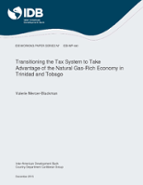Transitioning the Tax System to Take Advantage of the Natural Gas-Rich Economy in Trinidad and Tobago
Date
Dec 2015
In this paper, the author examines the current structure of the tax system for hydrocarbon production in Trinidad and Tobago in light of global trends in hydrocarbon taxation. Some of the main features of the tax regime are compared and benchmarked against what the literature has defined as best practices. The author calculates marginal effective tax rates, given assumptions of oil and gas prices and changes in tax incentives, and finds that tax levels are relatively adequate from an international perspective. Some of the more recent tax incentives, although helpful in terms of cash flow relief for companies, do not make as big of a difference to tax revenues and investment plans as do, for example, changes in international conditions when considered over the long run. Moreover, given the preeminence of natural gas in the economy, the tax system could be better modified to consider the special structural features of the gas market, while still encouraging investment in other energy sectors.




